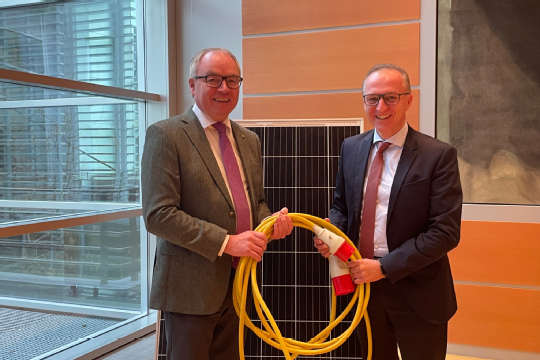Energy from wind and solar power will be further expanded according to the Lower Austrian path to energy independence with 250 additional wind turbines by 2035 and 130,000 additional PV systems by 2030, said Stephan Pernkopf, Deputy Provincial Governor, today (Friday) in St. Pölten, where he presented the campaign for the expansion of the electricity grid together with APG’s CTO Gerhard Christiner.
"This means a tripling of wind power and a quadrupling of solar power, i.e. an additional 10,000 GWh of green electricity. This means we are rebuilding the equivalent of the electricity supply of the whole of Styria within a few years," emphasized the Deputy Governor. In view of the concerns about the capacity and reliability of the power grids, he added: "We already have one of the most reliable grids in the world. With an average of only 20 minutes of outages per year Lower Austria occupies a top position in Europe ".
However, the electricity grid has to be massively expanded even further – to provide the basis for energy independence, security of supply, more renewables and thus climate protection. Therefore, he said, EVN and Netz Niederösterreich, the largest grid operator in Lower Austria, must put forth the greatest effort and the greatest speed in order to create sufficient grid capacity and have new green power plants connected to the grid. "Netz Niederösterreich will therefore invest 250 million euros every year in the modernization and reinforcement of the electricity grid. Currently, Netz Niederösterreich operates 92 substations, 40 are being newly built or completely modernized," said Pernkopf who also appealed to the other energy suppliers such as Wien Energie with its approximately 200,000 Lower Austrian customers to invest massively in the interests of energy independence and security of supply.
The Deputy Governor expressed special thanks to APG, which provides the electricity highways in Austria, as it were, and recently started operation of the 200 million euro Weinviertel line, which makes a decisive contribution to the electricity supply in Austria: "In the future, up to 3,000 MW of renewable energy from Lower Austria will be fed into APG’s trans-regional grid via the Weinviertel line and made available throughout Austria. This corresponds to the connected load of eight hydropower plants along the Danube."
"APG will also invest 3.5 billion euros in further expansion of the electricity infrastructure throughout Austria over the next ten years, of which just under 550 million euros will be invested in Lower Austria, so that a total of around 350 million euros will be invested annually in the power grids in Lower Austria alone. This is important because people must be able to rely on being able to connect their PV systems to the grid and on the electricity grids being reliable," announced the Deputy Governor.
However, appropriate favorable conditions on a federal level are also necessary for this, said Pernkopf, referring to faster permission procedures first and foremost: "In Lower Austria, nine out of ten EIA procedures are completed positively in less than one year, but then 50 percent of these projects get stuck at a federal level and are delayed there by five to seven years. These are valuable years that are lost for a secure and independent energy supply throughout Austria".
In addition, there is a need for simpler funding systems, especially for PV facilities, where more than 100,000 people have already been denied aids this year: "People must not be degraded to supplicants," demanded the deputy head of the regional government, who concluded by criticizing the increase in grid costs for households by 87 euros per year net (or plus 36 percent) and called for more innovative solutions for battery, large-scale and community storage systems.
Gerhard Christiner, CTO of APG, said: "The energy transition will be decided in the power grid. For a successful transformation of the energy system in terms of security of supply and for us to be able to cover the entire electricity demand with renewable sources by 2030, we must massively convert and expand the entire infrastructure. This requires an overall plan for the whole system and the rapid implementation of projects: the Weinviertel line was implemented in six years - from the idea to its start of operation. It is a showcase model for Austria, but unfortunately the exception: approval procedures still take far too long. We are investing a total of 3.5 billion euros in our electricity infrastructure by 2032 and thus in the security of supply throughout Austria, as well as the electrification of businesses, industry and society."
Christiner also explained that of Austria's 70 terrawatt hours of electricity demand, 10 would be imported, 10 more covered by thermal power plants and the rest by renewable energies. While almost two-thirds of the countries in Europe are import-dependent, he does not expect any major problems for Austria for the winter, if the weather is not too extreme.
"However, insufficient grid capacity causes significant costs. For example, one megawatt hour in Austria is 30 euros more expensive than in Germany. At 70 terrawatt hours, we pay around 2 billion euros more than we should because grid capacities are not sufficient. In addition, the costs of congestion management have also risen exorbitantly to 640 million euros at present, so that approximately 2.5 billion euros in costs are incurred because the grid is not adequately and synchronously expanded," specified APG’s CTO.
At the current pace, Christiner said, the energy transition's goal of a 27 terawatt-hour increase by 2030 is not achievable, which is why accelerated and efficient procedures, appropriate expert competence, fair procedures, a modified regulatory framework, smart solutions for household electricity consumption and, last but not least, measures such as community storage facilities are essential.
Press contact
Christoph Schuh
Downloads

